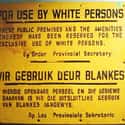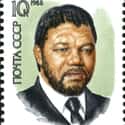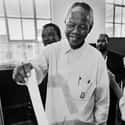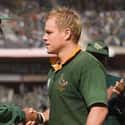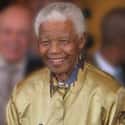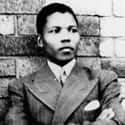-
(#3) When Targeted By The Government, He Launched A Campaign Of Defiance
The South African government began subjecting Nelson Mandela to official restrictions as punishment for his political activism in 1952, barring him from things like traveling and public speaking at will. This was a unique apartheid measure taken against political opponents of the South African government, which maintained the legal ability to restrict the right to assembly and political association. Mandela, in true badass form, ignored the ban and became involved in the 1952 "Defiance Campaign," a concerted effort to disrupt segregated areas and stage other acts of civil disobedience. Over 8,000 people were arrested during the course of the campaign. Most were released with minor penalties, but Mandela and other prominent activists were tried for "statutory communism" and sentenced to suspended prison sentences.
-
(#11) He Managed To Negotiate A Peaceful End To Apartheid
Nelson Mandela and FW de Klerk spent years attempting to assemble a transition that would satisfy a black majority that had been treated unjustly and a white minority that feared retribution and even violent expulsion from their homeland. Eventually, a multi-racial transition team was formulated, the constitution was rewritten, and a free-election date was set. But the most impressive aspect of Mandela's involvement in this process was his decision not to seek retribution or revenge against the former perpetrators of apartheid. He refused demands for an international tribunal and instead called for a spirit of reconciliation and rebirth. South Africa remained a violent and politically polarized society, but few could criticize the perspective of Mandela, who, after 27 years of imprisonment, could have easily decided not to turn the other cheek. For their collaboration and transformational attitudes, Nelson Mandela and PW de Klerk shared the 1993 Nobel Peace Prize.
-
(#12) He Was The First President Elected By Universal Suffrage
In their apartheid-ending negotiations, Mandela and de Klerk agreed that free elections would be a part of the fundamental changes to South African society. As a result, in April of 1994, Nelson Mandela was elected President of the country's first multi-racial government, running unopposed. The ANC won 62% of the vote along with the majority of the seats in the National Assembly. Mandela attempted immediate measures to improve the standard of living for black South Africans and continued to support a policy of national reconciliation and patriotism. He helped finalize the process for the adoption of a democratic constitution. Towards the end of his first term, Mandela began the gradual transferral of his political power to other members of the ANC.
-
(#13) He Really Did The Things That Happen In The Movie "Invictus"
The South African national rugby team known as the "Springboks" was a longtime, beloved symbol of the white minority, who worshipped the team despite a sports boycott that prevented it from international competition. This boycott ended in 1993, and Nelson Mandela was urged to change the uniform and logos of the team, which were perceived as symbols of apartheid. Instead, Mandela, keeping with his desire for reconciliation, decided to urge a new nationwide acceptance of the almost completely white team as another symbol of national reconciliation.
In 1995, the year South Africa was allowed back into international competition, the Sprigboks began a dream run in the Rugby World Cup, which resulted in a finals match against New Zealand, the overwhelming favorite. Before the game, the "Boks" visited Mandela's former Robben Island cell for inspiration and sang both versions of the national anthem, which was usually sung along racial lines. Nelson Mandela greeted the players dressed in a Springboks jersey and cap, in a Johannesburg stadium filled with over 60,000 people. As the film recounts, the game dramatically reached overtime with South Africa prevailing, 15-12. Mandela presented the trophy to team captain Francois Pienaar, a moment that was viewed in South Africa as a nationally transcendent event.
-
(#15) He Didn't Even Stop Fighting In His Nineties
Nelson Mandela died on December 5, 2013, aged 95. Following his retirement from politics in the late '90s, Mandela continued his activism in advancing various humanitarian causes. These endeavors included highly visible foundational efforts to combat AIDS, provide Rhodes scholarships to African scholars, and efforts to improve public health in underprivileged societies. Mandela was instrumental in bringing the 2010 World Cup to South Africa and established the Nelson Mandela Foundation, dedicated to addressing global concerns and increasing awareness of challenges to democracy and human rights. He was vocally critical of the 2003 invasion of Iraq and also criticized Robert Mugabe, the dictatorial leader of Zimbabwe. He was universally mourned, and his funeral in Johannesburg was attended by approximately 90 world leaders, including President Barack Obama.
-
(#1) He Created South Africa's First Black Law Firm
Nelson Mandela was born Rolihlahla Mandela on July 18, 1918 in a rural area of the Transkei region of South Africa. His name was anglicized to "Nelson" when he became the first member of his family to attend school. At age 9, Mandela's father died, and Nelson was adopted by an influential tribal chieftain. Eventually, however, Mandela's activist bent would make it impossible for him to continue his education in Johannesburg; a family dispute over an arranged marriage and a threatened expulsion over student politics prompted him to flee. However, he managed to complete his education and ultimately enrolled in law school. He eventually founded the first black-partnered law firm in South Africa with another student acquaintance, Oliver Tambo. Mandela and Tambo represented black litigants and defendants who normally would not have been able to afford legal counsel.
New Random Displays Display All By Ranking
About This Tool
On February 11, 1990, Nelson Mandela was released from prison after 27 years of arrest and soon continued to serve as President of South Africa. Even after his death, his great spirit and deeds inspired countless people to advocate for peace and social justice. Mandela was an active anti-apartheidist, after entering politics, he successfully organized and led the "Contempt of Unjust Acts Movement" and won the respect of all blacks.
Mandela received praise from all over the world, including winning the 1993 Nobel Peace Prize in recognition of his contributions to South Africa and world peace. The random tool introduced 15 fascinating facts about the difficult but inspiring life of Nelson Mandela.
Our data comes from Ranker, If you want to participate in the ranking of items displayed on this page, please click here.











